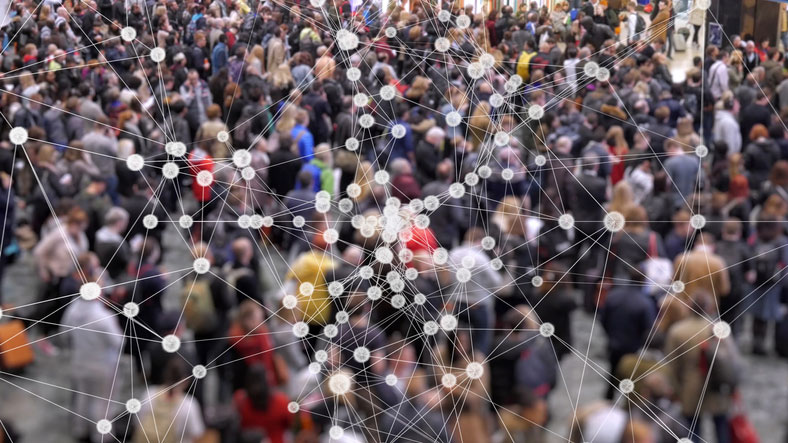Written by Scott Wilson

Many of the most exciting potential applications for artificial intelligence are all about human health.
If it seems strange that the machines will be coming to the rescue of frail humans, you have to consider the strengths of machine learning systems:
- Ability to crunch large amounts of disparate but related data quickly
- Capable of developing unique insights and correlations that human observers might fail to connect
- The skill to present finding or ask questions in plain English, or other languages
- Can be rapidly scaled up to meet emerging challenges with additional computing resources
When you line those strengths up with the challenges faced by epidemiologists and public health officials, you’ll see quickly why the whole field is excited about artificial intelligence.
What Do Epidemiologists and Public Health Teams Do?
 Having just survived a global pandemic, everyone is pretty familiar with what epidemiologists and public health officials do.
Having just survived a global pandemic, everyone is pretty familiar with what epidemiologists and public health officials do.





Epidemiologists study the spread and causes of disease, while public health officers monitor such outbreaks and develop the population-level interventions to stop them in their tracks.
But COVID-19 revealed plenty of cracks in the system. And it also caused a major distraction from other big public health issues, which are now exploding into serious risks:
- Fentanyl and other illicit drug addictions
- Increasing infant and maternal mortality rates
- Higher levels of gun deaths and suicides
- Increasing traffic death rates
Making matters worse, the share of total expenditures on public health in 2023 was lower than it was in 2002. With less resources to go around, and a workforce burnt out by the pandemic, it’s a heavy lift to address new epidemics.
How Artificial Intelligence Is Changing the World of Epidemiology and Public Health
 Fortunately, the new abilities about to be unleashed in the world of public health and epidemiology via artificial intelligence can make a dent in all of these problems.
Fortunately, the new abilities about to be unleashed in the world of public health and epidemiology via artificial intelligence can make a dent in all of these problems.
Disease surveillance is one of the clearest applications for AI in both public health and epidemiology. With the capability to quickly process extremely large amounts of unstructured data, and proven abilities to discern trends and find connections between apparently unrelated pieces of information, machine learning algorithms will sift together everything from lab reports to social media posts. AI will be able to spot the next major outbreak before human scientists. The extra days or months to respond can be critically important.
AI tools may allow more rapid contact tracing from less information, as well. Interactive AI agents can interview individuals in conversational language, drilling down into symptoms and history to elicit risks and exposures. They can cover far more territory in far less time and at less expense than traditional contact tracers.
Of course, AI will be a strong contributor in medical science itself, the place where diseases are identified and dissected to find their causes and cures. Public health officials will lean on those capabilities when it’s time to intervene in major health problems.
Similarly, pharmaceutical development, the hero of the COVID-19 pandemic, is getting a boost in drug discovery and manufacturing abilities from AI. That may mean that the next vaccine we need can be created in weeks, dramatically changing the tools available to public health professionals in responding to outbreaks.
Looking at Who and What Kind of Jobs Will Emerge in AI for Public Health
Governments will be the big employer for AI engineers and developers working in public health. For epidemiology, both governments and major healthcare systems will need AI professionals for support.
Particularly in the early stages of AI systems development for public health, universities are likely to be the focal point for these jobs.
Those positions will run the full spectrum of different types of AI careers, from AI analysts, to engineers, to AI architects.
At least at first, they will revolve around the research and development end of the spectrum. Computer science researchers and hardcore machine learning algorithm designers will have to pave the way for eventual connections between the science of epidemiology and the practical uses in public health.
What Are the Best Degrees to Earn for Developing AI for Epidemiology and Public Health?
 Those researchers will almost certainly have highly specialized master’s degrees, or even doctoral credentials like a PhD in Computer Science and Informatics specializing in Bioinformatics and Biomedical Informatics.
Those researchers will almost certainly have highly specialized master’s degrees, or even doctoral credentials like a PhD in Computer Science and Informatics specializing in Bioinformatics and Biomedical Informatics.
In fact, most AI experts looking to work in public health and epidemiology are likely to pursue similar specializations. A Master of Science in Health Care Analytics and Information Technology or a Master of Science in Applied Artificial Intelligence Concentration in Bioengineering offer solid preparation as well.
They combine studies in ML, deep neural networks, AI ethics, and other key features of the industry with classes to help get your head into healthcare and health information process.
There are even more specialized programs available, like a Master of Science in Computational Epidemiology and Systems Modeling or a Master of Science in Computational Precision Health. Although they don’t say AI right in the title, the reality is that these fields are being dramatically reshaped by artificial intelligence. Machine learning is already being wrapped into those curriculum plans and research projects.
Certificate Programs Help Current Professionals Develop AI Expertise
 Certificate programs are another option for computer science or statistics professionals interested in making the shift to working on AI in public health. Educational certificates last only a few months and involve taking only a handful of classes. That makes them faster and less expensive than a full degree. Of course, you get only a slice of the kind of education a degree offers, so you must already have a firm foundation in a related field.
Certificate programs are another option for computer science or statistics professionals interested in making the shift to working on AI in public health. Educational certificates last only a few months and involve taking only a handful of classes. That makes them faster and less expensive than a full degree. Of course, you get only a slice of the kind of education a degree offers, so you must already have a firm foundation in a related field.
Educational certificates come in a couple of different flavors that might be useful depending on your background:
- For highly qualified individuals who already have machine learning down cold, an Artificial Intelligence in Public Health and Healthcare Certificate or an Artificial Intelligence and Big Data Analytics for Public Health Certificate offer an overview of the unique ethical, data handling, and mission requirements in healthcare as they relate to AI use.
- For computer science professionals who are already engaged in the public health field, a Graduate Certificate in Artificial Intelligence comes with the specific tools and techniques used in AI to power up your current expertise.
Professional Certification Shows Expertise in Specific Aspects of Artificial Intelligence Development
 Another kind of certificate, professional certification, is a big feature in the worlds of both healthcare and information technology. Instead of being offered by colleges, like educational certificates, these are awarded by industry professional organizations or equipment and software vendors. Rather than delivering an education in a particular area, they test your knowledge and skills and validate them, so employers know you have what it takes to fill a position.
Another kind of certificate, professional certification, is a big feature in the worlds of both healthcare and information technology. Instead of being offered by colleges, like educational certificates, these are awarded by industry professional organizations or equipment and software vendors. Rather than delivering an education in a particular area, they test your knowledge and skills and validate them, so employers know you have what it takes to fill a position.
While there are many artificial intelligence certifications available, nothing specific to public health or epidemiology exist. Still, existing certs can offer a strong recommendation about your skills in areas that are going to be key in public health AI uses, like the Google Professional Machine Learning Engineer Certification for anyone who may work with the Google Cloud Healthcare API.
AI will help the public health field prepare for the next pandemic, and to manage the response when it comes. But professionals in the field are needed to lay the groundwork for those capabilities now—so the next great threat doesn’t shut down the whole world for a year or more.





